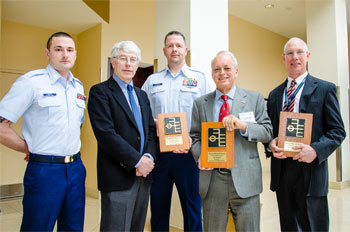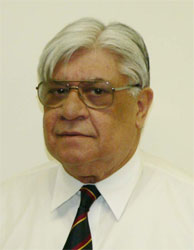The editors of Professional Mariner have presented this year’s Plimsoll Awards for Outstanding Service to the U.S. Coast Guard office whose mission is to help vessel operators avoid casualties, to a mariner trainer who pioneered the concept of bridge resource management and to an industry executive who has advocated measures to end sinkings resulting from cargo liquefaction.
 |
|
Brian Gauvin |
|
Attending the 2013 Plimsoll Awards ceremony were, from left, Coast Guard MST 1 Todd Martin, Professional Mariner Editor John Gormley, MSTC Robert Fairchild, Clay Maitland and Capt. Bob Becker, who accepted an award on behalf of MITAGS colleague Capt. Richard Beadon. |
The U.S. Coast Guard’s Office of Investigations & Casualty Analysis was selected as a Plimsoll winner for outstanding service by an organization for its work in casualty prevention. The mission statement of the office says: “We lead Coast Guard’s investigation program to promote safety, protect the environment, and to prevent future accidents.”
The office has long been responsible for analyzing casualties in order to determine their causes and develop recommendations to help the industry avoid future mishaps. But this process can take months or years to run its course. In recent years, the office has taken the initiative to issue safety alerts as soon as a problem has been identified. These alerts typically do not make reference to a specific casualty. But they do provide the industry with the latest information regarding how to address problems that may have contributed to a recent serious accident.
The award was presented on March 19 at the Connecticut Maritime Association’s Shipping 2013 conference in Stamford, Conn. Based at Coast Guard headquarters in Washington, D.C., the Office of Investigations & Casualty Analysis is directed by Capt. David S. Fish. Accepting the award on behalf of the office was MSTC Robert Fairchild, a senior technician at the U.S. Coast Guard Safety Lab in New London, Conn.
Capt. Richard Beadon, who conducts simulator training at the Maritime Institute of Training & Graduate Studies (MITAGS) near Baltimore, was a winner of a Plimsoll for outstanding service by an individual. Beadon, whose career stretches over 50 years, has provided shiphandling and safe navigation simulator training to mariners around the world and is considered a pioneer in the development of the concept of bridge resource management (BRM).
One of the people who nominated Beadon for the award had this to say about him: “Richard is in many ways, a founding father of BRM. While working at Warsash, England, he introduced this subject to a generation of U.K. mariners. If you look at the book by Robert Meurn, Watchstanding Guide for the Merchant Officer, many of the figures and attachments are credited to Richard…. Seeing Richard teach … was a real eye opener. The whole concept of voyage or passage planning was taken to a different level. I firmly believe that this has increased the safety of U.S. mariners in a way that is profound… His concern for the mariner and his safety is tangible and constant.”
Beadon was unable to attend the Shipping 2013 conference due to illness. Accepting the award on his behalf was Capt. Bob Becker, director of business development at MITAGS.
 |
|
Courtesy MITAGS Capt. Richard Beadon |
Also receiving a Plimsoll for outstanding service by an individual was Clay Maitland, managing partner with International Registries. The award recognizes his efforts to spur action on the problem of liquefaction of cargoes (primarily nickel ore) aboard bulk carriers. Between 2010 and 2012 there were four sinkings of bulk carriers attributed to cargo liquefaction. Those sinkings took the lives of 66 mariners.
Maitland has been sounding the alarm about the problem in the hopes of convincing the industry to take action to end what are essentially avoidable accidents. Liquefaction occurs when certain ores are stored in ways that allow their water content to rise above levels that allow them to be transported safely. While some classification societies have issued standards for newbuilds that should help to reduce the dangers, Maitland has insisted that these design standards by themselves are not enough to end the problem. He has called for additional measures that include criminal penalties for misdescribing cargos, declaring uncovered terminals to be unsafe, and giving shipmasters authority to demand independent documentation of the moisture content of cargos.
“If we make enough noise, finally there will be a stop to these sinkings,” he has declared.
